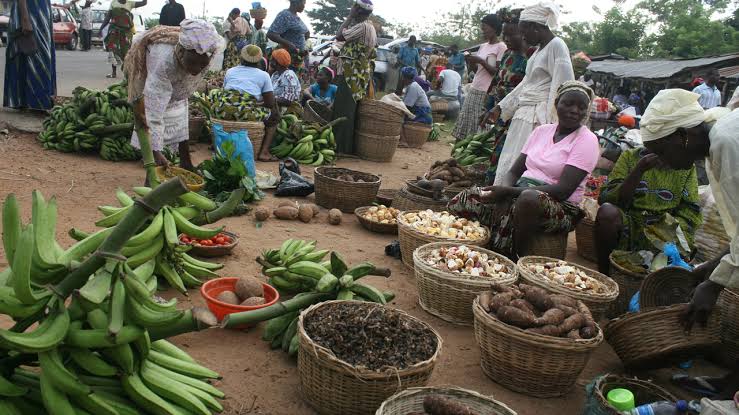World Food Day: Nigeria’s food future hinged on today’s actions

By Olamide Francis, Lagos
The theme of this year’s World Food Day is a wake-up call to all and sundry, especially African nations and more importantly, sub-Saharan nations. The theme is “Grow, nourish, sustain together. Our actions are our future.”
It reiterates the common advisory proverb that “If you fail to plan, you’re planning to fail.” Indeed, Africa needs a long term plan if it seeks to significantly reduce the rate of malnutrition and boost food security.
With a total of 256 million hungry people on the continent, and 239 million of that number nesting in sub-Saharan Africa, this year’s World Food Day theme speaks directly to its leaders, agriculture policy makers, and farmers in one of the most beggarly regions of the world.
While we can attribute all food problems in Africa and Nigeria to climatic shocks, conflicts, economic slowdowns, and downturns –sometimes overlapping – we must brace ourselves for the future, for our actions are our future.
To understand what it means for a country to be food secured, let us appraise the WHO meaning of food security. The apex body clearly said that “food security means that all the people in a given place at all times have physical, social and economic access to sufficient, safe, and nutritious food that meets their food preferences and dietary needs for an active and healthy life.”
In an attempt to sum-up the WHO definition for a layman, it clearly states that not only must there be healthy and sufficient food in a country/place, it also emphatically states that all citizens must have the purchasing power to buy the food at their own will.
According to the Voice of America, Nigeria’s population will almost tripled in 2050. What this means is that food demand will automatically triple or quadruple. Nigeria, the most populous black nation, will have a lot to deal with in terms of food production.
An embarrassing food crisis is imminent if the country fails to act now. Recently, the minister of agriculture, Alhaji Sabo Nanono, made bold claims that the federal government had curbed food importation and Nigeria is now Africa’s largest producer of rice – a claim that an average Nigerian cannot attest to.
On a contrary, Nigeria is the world’s largest importer of rice after China and the Philippines according to a report published by Statista in February 2019. Nigeria isn’t even on the list of top 30 milled rice-producing countries of the world. African countries that came close were South Africa and Senegal occupying the 23th and 27th positions respectively.
More so, we still have challenges with strengthening our border security to check smuggling and movement of small arms. Anything can penetrate the border of Nigeria. It is only a matter of how much one is willing to pay.
How then has government curbed food importation? The national grain reserve is not functioning to its full capacity and a huge food import bill hangs over the country.
Not only do we not have enough food to match the demand of our teeming population, majority of our population either lack the financial capacity to buy what they love to eat, or it is not readily available, or a combination of both.
All indicators point to the truth that Nigeria is facing a serious food crisis and food insecurity – an unfortunate situation, aided by the oil discovery curse and long neglect of the agricultural sector.
The evidence isn’t far-fetched as the price of food items are on the increase. Food is largely unavailable and unaffordable to the middle and lower classes in Nigeria.
The Way Forward
The recent pledge made by the federal government to support agriculture through the Agro Processing Productivity Enhancement and Livelihood Improvement Support Project (APPEALS) that will set aside N600 billion as loan support to at least 2.4 million farmers across the country is laudable.
However, the number of beneficiaries should be reduced. Funds should be made available only to already commercial farmers and subsistence farmers who have the capacity to grow into commercial farming. It shouldn’t just be about disbursement but impact.
The government should seek ways to upgrade a large number of subsistence farmers in Nigeria to produce commercially. One of the long-standing banes of Nigeria’s agricultural sector is the lack of political will to replace crude implements with machinery for small scale farmers.
The government has – through neglect of the sector – encouraged small scale farming. Yet, we want a nation that produces what it eats – a dream that’s impossible to attain. Nigeria is over-reliant on small scale farming, and it will always lead to low productivity and return on investments.
The ministry of agriculture should also look into the unavailability and low purchasing power of food by the middle class and the lower class. Commercial farmers usually prefer to sell at the international markets or to the upper class at premium prices thereby reducing the availability of food for the middle and lower class.
If they eventually consider selling to this disadvantaged class, they exploit the existing scarcity and make them pay through their nose. The future of Nigeria’s agriculture and food sufficiency can only be brightened by conscious efforts.
